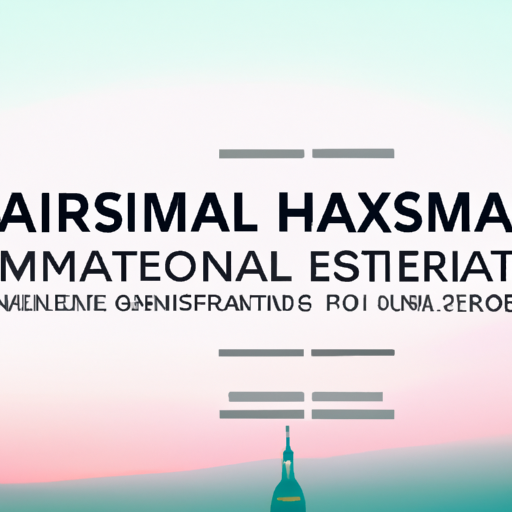Key Findings from the HAMA Fall 2023 Conference Industry Outlook Survey
The Hospitality Asset Managers Association (HAMA) recently released the results of its Fall 2023 Conference Industry Outlook Survey, providing a comprehensive snapshot of the current state of the hospitality industry. The survey, which was conducted among HAMA members, offers valuable insights into the trends, challenges, and opportunities that are shaping the industry.
One of the key findings from the survey is the optimistic outlook for the hospitality industry. Despite the challenges posed by the ongoing pandemic, a majority of respondents expressed confidence in the industry’s resilience and potential for growth. This optimism is underpinned by the expectation of a strong rebound in travel demand, driven by pent-up consumer desire for leisure and business travel.
The survey also highlighted the increasing importance of technology in the hospitality industry. Many respondents noted that the pandemic has accelerated the adoption of digital technologies, such as contactless check-in and mobile room keys. These technologies not only enhance guest experience but also improve operational efficiency. Moreover, data analytics is emerging as a critical tool for asset managers, enabling them to make informed decisions based on real-time data.
Sustainability is another key theme that emerged from the survey. There is a growing recognition among asset managers that sustainability is not just a moral imperative but also a business opportunity. Many respondents indicated that they are actively seeking ways to reduce their properties’ environmental footprint, such as by implementing energy-efficient practices and sourcing locally produced food. Furthermore, there is a growing demand among consumers for hotels that are committed to sustainability, which can give a competitive edge to those that embrace green practices.
The survey also revealed some of the challenges facing the hospitality industry. One of the main concerns is labor shortage, which has been exacerbated by the pandemic. Many respondents reported difficulties in recruiting and retaining staff, which can impact service quality. To address this issue, some are exploring innovative solutions, such as automation and partnerships with hospitality schools.
Another challenge highlighted in the survey is the need for continuous adaptation to changing consumer preferences. Today’s travelers are looking for personalized experiences, and hotels need to be able to cater to these evolving demands. This requires a deep understanding of customer needs and preferences, as well as the ability to innovate and adapt quickly.
The HAMA Fall 2023 Conference Industry Outlook Survey provides a valuable glimpse into the current state and future direction of the hospitality industry. The findings underscore the industry’s resilience and adaptability, as well as the opportunities and challenges that lie ahead. As the industry continues to navigate the post-pandemic landscape, these insights will be crucial in shaping strategies and driving growth.
In conclusion, the survey paints a picture of an industry that is optimistic about the future, embracing technology and sustainability, and constantly adapting to meet the needs of its customers. It also highlights the importance of addressing labor shortages and staying attuned to changing consumer preferences. As we move forward, these insights will be invaluable in helping the industry navigate the road ahead.
Understanding the Impact: HAMA’s Fall 2023 Conference Industry Outlook Survey Results

The Hospitality Asset Managers Association (HAMA) recently released the results of its Fall 2023 Conference Industry Outlook Survey, providing a comprehensive snapshot of the current state of the hospitality industry. The survey, which was conducted among HAMA members, offers valuable insights into the trends, challenges, and opportunities that are shaping the industry.
The survey results reveal a cautiously optimistic outlook for the hospitality industry. Despite the ongoing challenges posed by the COVID-19 pandemic, the majority of respondents anticipate a steady recovery in the coming months. This optimism is underpinned by several key factors, including the widespread availability of vaccines, the easing of travel restrictions, and the pent-up demand for travel and tourism.
One of the standout findings from the survey is the shift in consumer preferences and behaviors. The pandemic has accelerated the adoption of digital technologies in the hospitality industry, with more consumers opting for contactless services and digital experiences. This trend is expected to continue, with many respondents predicting that digital transformation will be a key driver of growth in the industry.
The survey also highlights the importance of sustainability in the hospitality industry. A significant number of respondents indicated that they are prioritizing sustainability in their operations, reflecting a growing consumer demand for eco-friendly practices. This trend is likely to shape the future of the industry, with hotels and other hospitality businesses needing to adapt their operations to meet these changing consumer expectations.
However, the survey also points to several challenges facing the industry. Labor shortages, supply chain disruptions, and rising costs are among the top concerns for hospitality asset managers. These challenges are compounded by the uncertainty surrounding the pandemic and its potential impact on travel and tourism.
Despite these challenges, the survey results suggest that the hospitality industry is resilient and adaptable. Many respondents indicated that they are exploring new business models and strategies to navigate these uncertain times. These include diversifying revenue streams, leveraging technology to improve operational efficiency, and focusing on customer experience to drive loyalty and repeat business.
The survey also underscores the importance of collaboration and partnerships in the industry. Many respondents highlighted the need for greater collaboration between different stakeholders, including hotel owners, operators, and asset managers. This collaborative approach is seen as crucial in addressing the challenges facing the industry and driving its recovery.
In conclusion, the HAMA Fall 2023 Conference Industry Outlook Survey provides a valuable glimpse into the current state and future direction of the hospitality industry. The findings underscore the industry’s resilience and adaptability in the face of challenges, as well as the opportunities for growth and innovation. As the industry navigates the path to recovery, these insights will be crucial in shaping strategies and informing decision-making.
The survey results serve as a reminder that the hospitality industry is constantly evolving, shaped by changing consumer preferences, technological advancements, and global events. As such, it is essential for hospitality asset managers to stay informed and adaptable, ready to seize the opportunities and navigate the challenges that lie ahead.
Insights and Trends: A Deep Dive into HAMA’s Fall 2023 Conference Industry Outlook Survey Results
The Hospitality Asset Managers Association (HAMA) recently released the results of its Fall 2023 Conference Industry Outlook Survey, providing a wealth of insights and trends that are shaping the hospitality industry. The survey, which was conducted among HAMA members, offers a deep dive into the current state of the industry, as well as a glimpse into what the future may hold.
One of the key findings from the survey is the continued growth and resilience of the hospitality industry, despite the challenges posed by the global pandemic. The majority of respondents reported positive performance metrics for their properties, with many noting an increase in occupancy rates and average daily rates. This is a testament to the industry’s ability to adapt and innovate in the face of adversity.
The survey also highlighted the importance of technology in driving the industry forward. From contactless check-ins to AI-powered customer service, technology is playing an increasingly crucial role in enhancing guest experiences and streamlining operations. Many respondents indicated that they plan to increase their investment in technology in the coming years, signaling a shift towards a more digital, tech-driven hospitality industry.
Sustainability was another key theme that emerged from the survey. With growing awareness about the environmental impact of the hospitality industry, many asset managers are taking steps to make their properties more sustainable. This includes implementing energy-efficient practices, reducing waste, and sourcing locally-produced food and beverages. The survey results suggest that sustainability is no longer just a buzzword, but a business imperative that is shaping the future of the hospitality industry.
The survey also shed light on the changing dynamics of the workforce in the hospitality industry. With the ongoing labor shortage, many respondents reported challenges in attracting and retaining talent. To address this, some are exploring innovative solutions such as flexible work arrangements, enhanced training programs, and competitive compensation packages. The survey results underscore the need for the industry to rethink its approach to talent management in order to thrive in the post-pandemic world.
Looking ahead, the survey revealed a sense of cautious optimism among HAMA members. While there are still uncertainties surrounding the pandemic and its long-term impact on the industry, many respondents expressed confidence in the industry’s ability to bounce back. They cited factors such as the pent-up demand for travel, the resilience of the industry, and the ongoing innovations in technology and sustainability as reasons for their optimism.
In conclusion, the HAMA Fall 2023 Conference Industry Outlook Survey offers valuable insights into the current state and future direction of the hospitality industry. The results underscore the industry’s resilience, the growing importance of technology and sustainability, and the need for innovative approaches to talent management. As we navigate the post-pandemic world, these insights will be crucial in shaping the strategies and decisions of hospitality asset managers.
